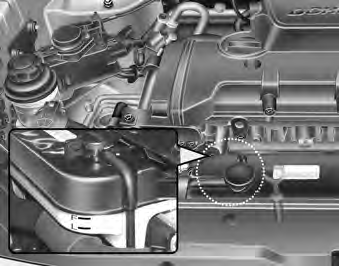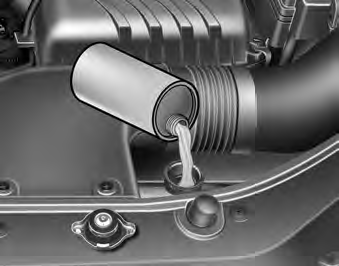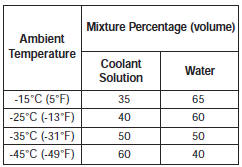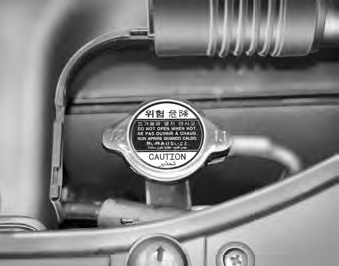Engine cooling system
The high-pressure cooling system has a reservoir filled with year-round antifreeze coolant. The reservoir is filled at the factory.
Check the antifreeze protection and coolant level at least once a year, at the beginning of the winter season, and before traveling to a colder climate.
Checking the coolant level
WARNING - Removing
radiator cap
• Never attempt to remove the
radiator cap while the engine
is operating or hot. Doing so
might lead to cooling system
and engine damage and could
result in serious personal
injury from escaping hot
coolant or steam.
• Turn the engine off and wait until it cools down. Use extreme care when removing the radiator cap. Wrap a thick towel around it, and turn it counterclockwise slowly to the first stop. Step back while the pressure is released from the cooling system. When you are sure all the pressure has been released, press down on the cap, using a thick towel, and continue turning counterclockwise to remove it.
• Even if the engine is not operating,
do not remove the radiator
cap or the drain plug
while the engine and radiator
are hot. Hot coolant and steam
may still blow out under pressure,
causing serious injury.

Check the condition and connections of all cooling system hoses and heater hoses. Replace any swollen or deteriorated hoses.

The coolant level should be filled between F and L marks on the side of the coolant reservoir when the engine is cool.
If the coolant level is low, add enough specified coolant to provide protection against freezing and corrosion.
Bring the level to F, but do not overfill.
If frequent additions are required, see an Authorized Kia Dealer for a cooling system inspection.
Recommended engine coolant • Use only soft (de-mineralized) water in the coolant mixture.
• The engine in your vehicle has aluminum engine parts and must be protected by an ethylene-glycolbased coolant to prevent corrosion and freezing.
• DO NOT USE alcohol or methanol coolant or mix them with the specified coolant.
• Do not use a solution that contains more than 60% antifreeze or less than 35% antifreeze, which would reduce the effectiveness of the solution.
For mixture percentage, refer to the following table.


WARNING - Radiator cap Do not remove the radiator cap when the engine and radiator are hot. Scalding hot coolant and steam may blow out under pressure causing serious injury.
Changing the coolant
Have coolant changed by an authorized
KIA dealer according to the
Maintenance Schedule at the beginning
of this section.
CAUTION
Put a thick cloth or fabric
around the radiator cap before
refilling the coolant in order to
prevent the coolant from overflowing
into engine parts such
as generator.
WARNING - Coolant
• Do not use radiator coolant or
antifreeze in the washer fluid
reservoir.
• Radiator coolant can severely
obscure visibility when
sprayed on the windshield
and may cause loss of vehicle
control or damage to paint
and body trim.
See also:
Owning
The Kia's length, width and stretched wheelbase provide excellent legroom in
the rear. The boot is also generous, with a 420-litre luggage capacity. In the
front, though, the cabin doesn't give yo ...
Trunk
Outside the vehicle
• To open the trunk, insert the key into
the lock and turn it to the right (clockwise).
• To close the trunk, use both hands to
push the trunk lid down. Check to see
if ...
Engine compartment
1. Engine coolant reservoir ...................7-12
2. Engine oil filler cap............................7-11
3. Brake fluid reservoir ..........................7-14
4. Air cleaner................ ...


